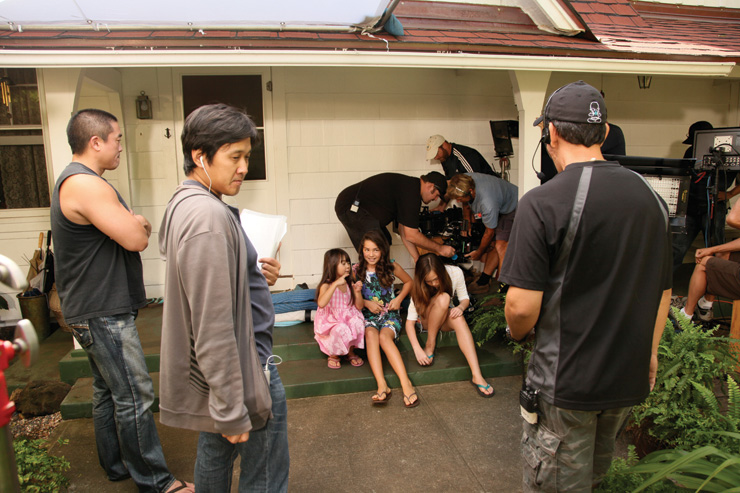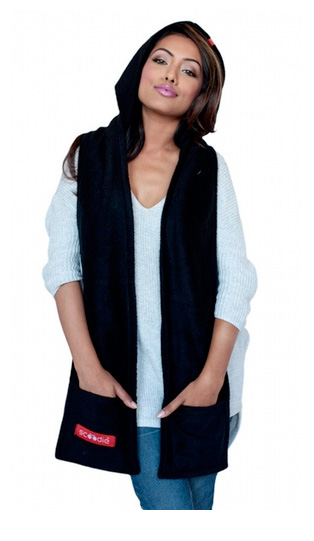 Sung Kang and Kimberly-Rose Wolter play exes in Knots, which was written by Wolter.
Sung Kang and Kimberly-Rose Wolter play exes in Knots, which was written by Wolter.
Love, Hawaiian Style
Kimberly-Rose Wolter, Michael Kang and Sung Kang dish about Knots, their new romantic comedy set in Hawaii—how their film moves beyond loud shirts and luaus, and how it even saved Sung’s life.
by Oliver Saria
The list of mishaps that befell actor/writer/producer Kimberly-Rose Wolter while shooting the new romantic comedy Knots in her home state of Hawaii might lead one to believe that she had touched a cursed tiki. There was the gash on her foot that had festered; telltale red streaks began inching up her leg, an indicator of sepsis, potentially fatal blood poisoning. Then there was the jellyfish that stung her forehead when she went night swimming after production had wrapped for the day.
And there was also the centipede in her slipper that stung her foot three times. But, despite all of that, the shoot sounded more charmed than cursed.
“Everyone really got a chance to know each other,” says Wolter. “We formed a really nice relationship like a little family.”
That’s a sentiment shared by director Michael Kang (The Motel and West 32nd) and co-star Sung Kang (no relation), of Fast Five and Better Luck Tomorrow fame, who not only embraced Wolter’s script, but also the film’s other star: Hawaii.
In the romantic comedy, Ileana Douglas (Goodfellas, Cape Fear) plays the family matriarch, Miriam, who has three daughters from three different men. Lily (played by Wolter) is one of those daughters, and after rejecting her boyfriend’s marriage proposal, she hides out with her family in Hawaii and tries to help her mother and two younger sisters save their struggling wedding planning business. Complicating matters, Lily reconnects with her ex-boyfriend, Kai (Sung Kang), who is keeping a scandalous secret from her. The interwoven conflicts prompt the characters to explore the institution of marriage—the dream of it, the fear, the reality—and what it means to be in a committed relationship.
Naturally, since Wolter, like the character she plays in the film, is actually hapa (Hawaiian, Chinese, Korean, French, German and Hungarian—yes, in that order, as taught to her by her grandmother), born and raised in Hawaii, the first question people ask is: How autobiographical is the story? Well, for the record, she’s an only child. No, her family does not own a wedding planning business in Hawaii. But, yes, “I’m sure my mom would not appreciate this—she has been married three times.”
Knots also echoes Wolter’s own real-life skepticism about marriage. Though she’s been with the same man for nearly a decade (the two have a daughter together, and both have roles in the film), she doesn’t feel the need to get married. “[Marriage],” she insists, “is not one thing to all people. It can’t be.”
It’s a sentiment shared by Michael Kang, who is also kinda, sorta married.

“Yes, I have a baby mama,” he proclaims. “We have a much stronger bond than any piece of paper can force upon us. Plus, the whole idea of marriage is outside the realm of actually dealing with relationships.”
Relationships are at the core of the film, both on-screen and off.
In terms of production, one key relationship was the one the cast and crew formed with Hawaii itself. Shot entirely on location over a grueling 10-day schedule, with a limited budget of less than $1 million, the paradise-like surroundings proved a welcome healing balm.
“It was the shortest shoot I’ve ever done. If I was doing that in New York, it would have been crazy,” Michael notes. “Hawaii is very healing. To just swim in the ocean for an hour after the shoot—the ability to take time out and do that was amazing.”
It also helped that Michael had shadowed the Hawaiian production of the popular television series Lost as a participant of the ABC/DGA Directing Program in 2006 and 2007, so he was familiar with the kind of breakneck pace he’d need to keep. Wolter’s script, however, allowed him the opportunity to showcase Hawaii in ways rarely seen in television and film.
“Hawaii isn’t generally shown this way—with normal people,” Michael notes. “Not riddled with international crime or just the touristy side. What are the locals really like? What is normal life like?”
Indeed, Knots is that rare film set in Hawaii with actual Hawaiians in prominent roles told from a Hawaiian perspective.
What about Sung Kang, you might ask? He was born in Gainesville, Georgia, and now lives in Los Angeles, but Wolter says she senses “there’s some part of Sung that is Hawaiian. You see a lot of people pretend to be from Hawaii, but that specific vibe, you can’t really put on.”
Sung also felt it the moment he stepped off the plane—his first time on the island. “I really felt like I was home. It was weird,” he says. “Plus, I’m kind of a mellow dude to begin with, so that just fit.”
The production could not have come at a better time for him. Sung says he had actually been contemplating leaving the entertainment business for good. Questions like, “What’s the point? Why am I doing this? What is my contribution?” plagued the actor. But while shooting Knots, those questions were answered. He noted the encouragement he received from locals wherever he went, and reuniting with his old friend Michael, who had also directed him in The Motel. He also credited Wolter for fostering a family atmosphere on the set.
“The whole experience was so great, and there was so much gratitude on my part to Mike and Kim, the crew and cast, and the people of Hawaii,” says Sung. “Knots saved my artistic life. [It was a] reminder of why I became an actor. A reminder that people are rooting for me, and that I’m not alone.”
A charmed shoot, indeed.
Knots premieres at the Hawaiian International Film Festival on Oct. 17 and at the San Diego Asian Film Festival on Oct. 21. For more info on the movie, visit http://www.knotsfilm.com.
This article was published in the October 2011 issue of KoreAm. Subscribe today!
[ad#graphic-square]





